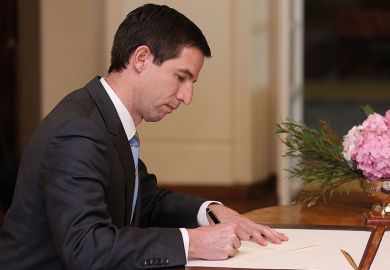I am a working-class academic trying to support a young family.
To say that means that my wife and I need to work in order to pay for rent, food and childcare. Being paid by a university to conduct research and teach classes is how we survive (my wife has just completed her PhD). So we need to go where work is available in our fields.
Last year, while on a fixed-term contract teaching film studies at the University of New South Wales, I applied for a grant from the Australian Research Council. Winning a large research grant, I was told by my head of school, was the only way to make my position permanent.
My proposal was titled “Red Hollywood: Communist Style before the Blacklist, 1917-1950”. Its purpose was to provide an original account of the relationship between Soviet cinema and Hollywood film-making by looking closely at the careers of several prominent US-based film-makers of the era, including Charlie Chaplin. It would have enhanced Australia’s reputation in the international field of film criticism.
More importantly, I think, it would have addressed, in an unusually concrete manner, one of the key questions of politically oriented film theory and of capitalist modernity: can works of mass culture be ideological without also being implicitly or explicitly utopian?
Hollywood cinema continues to influence society and culture today. It has shaped our strategies for mass communication and the tropes drawn on by advertising and marketing, thus projecting its reach into the realms of public policy, propaganda, social movements and the construction of cultural values. Moreover, critical research into the US’ dominant cultural forms, including its cinema, is as relevant today as it is strategically essential. This project, which would have looked at a moment in history when the global supremacy of the US was threatened, had lessons to teach about our own historical present, in which the US vies for economic hegemony with another superpower born of socialist revolution, China.
But my application was unsuccessful. No explanation was offered, but I assumed that it simply had not been ranked highly enough to be recommended for funding. So imagine my surprise when, at the end of October, it was revealed by Times Higher Education that, in fact, my proposal had been recommended for funding by the ARC, but had been one of 11 projects torpedoed by Simon Birmingham, who was then Australia’s education minister.
The debates in the wake of this revelation have focused on questions of academic freedom, the compromised integrity of the research sector, the ideologically backed devaluing and suppression of the humanities, and whether future research funding should be administered in accordance with fuzzily defined “national interest” criteria.
What all this neglects, however, is that ministerial intervention is not just a matter of political ideology but also of working conditions and social class. As a consequence of Birmingham’s actions, I was obliged to relocate my family to the other side of the planet, so that I could take up an academic post at the University of Exeter.
There is so much that is good about my new position, not the least of which is job security. But our preference would have been to stay in Australia, to contribute meaningfully to the life of the mind in the place we know best, in which we were born, raised and educated. Hence, the move was emotionally wrenching.
We are now impossibly far away from our family, our friends and anything like support networks and financial stability. Perhaps most excruciatingly, we have had to take our son away from his grandparents. That is not to mention the strain of facing off against the UK’s "hostile environment" immigration policy. We struggle daily with the challenges of our move. But without external funding, there is little academic work for early career researchers beyond precarious and short-term contracts.
When academic employment and promotion are indexed to funding capture, and when funding schemes are revealed to be directly responsive to political power, the consequences are bound to be dire. My story implies a situation in which only certain types of research and researchers will find a home within universities.
Scholarship that is outwardly critical or political, or which does not have obvious corporate or transactional applications, will find itself devalued. So unless the scholars who pursue such research are self-funded, there will be no place for them within the university either. It is up to academia to choose whether to unite against such a grim future.
The real irony in all this is that my project was to have retold the story of the Hollywood blacklist: the list of actors, directors and screenwriters denied work in the McCarthy era because of their alleged Communist sympathies. Like Chaplin, who was subpoenaed by the House Un-American Activities Committee, I have been forced to take my work elsewhere.
Mark Steven is a lecturer in 20th and 21st century literature at the University of Exeter.
POSTSCRIPT:
Print headline: The political becomes personal when a grant is killed by a minister
Register to continue
Why register?
- Registration is free and only takes a moment
- Once registered, you can read 3 articles a month
- Sign up for our newsletter
Subscribe
Or subscribe for unlimited access to:
- Unlimited access to news, views, insights & reviews
- Digital editions
- Digital access to THE’s university and college rankings analysis
Already registered or a current subscriber?










